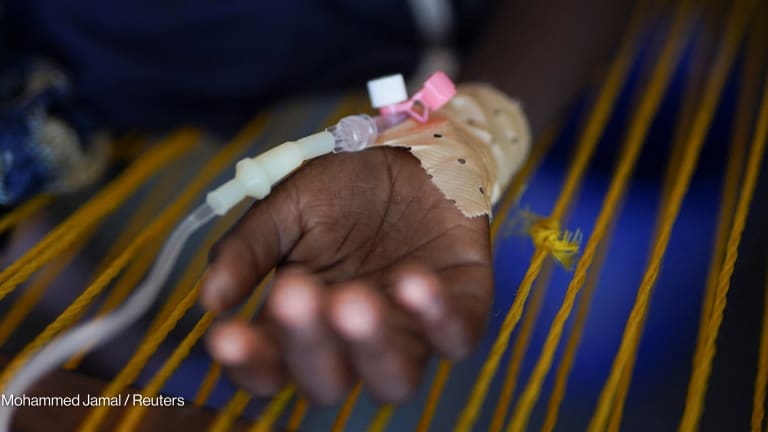
Ahead of COP 26, the WASH sector is asking whether water, sanitation, and hygiene are being neglected within global events. This follows last month’s United Nations Food Systems Summit and Africa Climate week, both of which highlighted the lack of attention paid to WASH.
WaterAid asked why clean water wasn’t on Africa Climate Week’s agenda and the World Wildlife Fund called out the UNFSS for failing to acknowledge rivers’ role in food production.
“Increasingly, since the declaration of the Sustainable Development Goals, we are experiencing growing neglect of WASH in major global conversations,” Hussaini Abdu, country director at CARE Nigeria, told Devex in an email.
This is despite WASH being linked with issues of both climate change and food security.
In a report on rivers’ role in food production, WWF said the UNFSS had neglected to acknowledge “the critical role that rivers play in feeding humanity.”
A single WASH-related reference — “water use” — could be found on the UNFSS event website, relating to the event’s nature-positive solutions “action track 3,” which was chaired by João Campari, food practice lead at WWF.
While Stephanie Ogden, water team director at CARE USA, said water also came up in action track 4, convened by CARE, on equitable livelihoods, “We, as a global community, need to press for more clearly defined actions around WASH and water resource management, particularly with respect to policies and investments,” she acknowledged.
Freshwater ecosystems are also mentioned in the UNFSS’s new Aquatic Food Solution Cluster — which was announced during the summit. “But the reality is that rivers have been overlooked and undervalued in discussions and decisions around food systems,” Richard Lee, communications manager at WWF’s Freshwater Practice, told Devex.
Following Africa Climate Week, Ronnie Murungu, WaterAid’s regional programs manager for East Africa and Ethiopia, also called for more to be done “around making sure that we get more voices and more prioritization.”
“We as a global community have to make sure that the WASH and water voices are in the room … voices that are facing challenges most acutely and directly.”
— Stephanie Ogden, water team director, CARE USA“If you looked at the side events that were organized, there was no side event that spoke specifically [to] WASH and that was our concern,” he said. Water was mentioned in 1 out of 50 events listed on the main event schedule.
But, once the event was underway, Murungu said clean water was referenced more than they’d anticipated, which spoke to the interconnectedness of dialogue between climate and water issues. “Joining these side events and main meetings we noted that WASH was mentioned, but of course not to the level we were expecting.”
Looking ahead to COP 26 in November, Murungu said he hopes there’ll be more opportunities for discussion around the nexus between WASH and climate change.
Currently, around 700 million people in 43 countries do not have enough water every day and climate change will make this worse as droughts dry up water sources, floods contaminate them, and storms inflict damage.
“Climate change is driving prolonged drought and severe flooding, which can make access to clean water difficult,” a COP 26 spokesperson said in an email. “Discussions on this issue will be integrated across COP26.”
A WASH and Climate Pavillion is also planned for the Glasgow event. According to the spokesperson COP 26 is working with partners, such as the Alliance for Global Water Adaptation, the Global Water Partnership, Sanitation and Water for All, and UNICEF, “to ensure the importance of water is reflected in countries’ national adaptation plans and nationally determined contributions [NDCs] being submitted in the run up to COP26."
Why WASH is not making the agendas
Thus far, WASH may not have been getting the attention it should, Murungu said, because the NDCs mostly focus on mitigation whereas WASH comes under adaptation work.
“Adaptation is as important as mitigation in the sense that we need to protect the most vulnerable from the impacts of climate change,” he said. “For WaterAid, we say that the climate crisis is a water crisis. The impacts of too much water or water scarcity have … implications on the health of communities.”
“There is a broad sector showing at a water pavilion at COP26 and we’re working hard — and coordinating better within our sector — to move it up the agendas going forward,” Alex Knezovich, director of operations at the Toilet Board Coalition, told Devex in an email.
But sometimes, the taboo or awkward nature of conversations around sanitation and hygiene means the sector is too easily pushed aside, she added.
While climate change and the pandemic have led to “moments in the spotlight” for WASH, Knezovich warned they’re at risk of being “just flashes in the pan.” She urged sector professionals to do better at “mobilizing and sustaining momentum and attention into sustainable systems and behaviour change.”
But, the problem isn’t just that water isn’t mentioned enough in these dialogues, Ogden said, it starts with the invite list.
“There are many global and local dialogues on food systems and climate change, and we as a global community have to make sure that the WASH and water voices are in the room, in addition to the women, youth, Indigenous, community, and civil society voices that are facing challenges most acutely and directly. That’s the only way water will be mentioned enough,” Ogden said.
“What it takes is just individuals understanding the connection and then doing what we can in our own roles to make it happen,” Knezovich said. “Too many in the world have grown up with a ‘flush and forget’ mentality.”
Visit the WASH Works series for more coverage on water, sanitation, and hygiene — and importantly, how WASH efforts intersect with other development challenges. You can join the conversation using the hashtag #WASHWorks.









